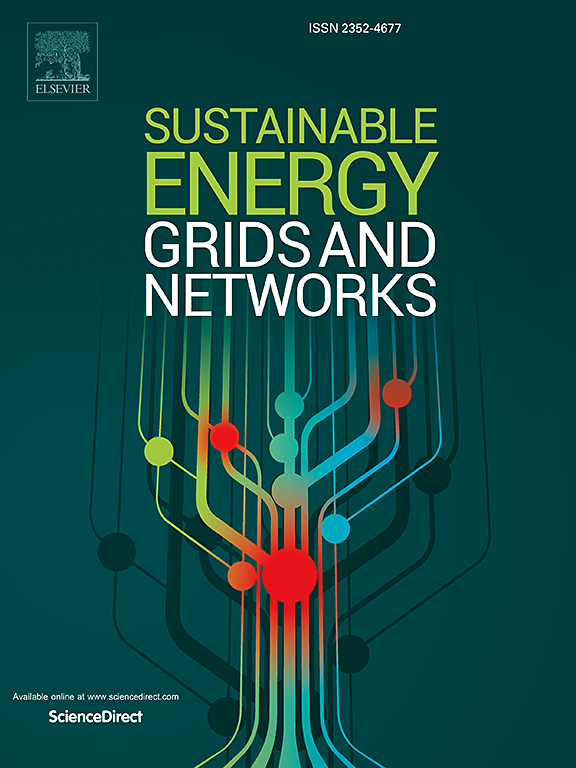日前电力市场中充电站运营商的最优策略:一个层次博弈框架
IF 5.6
2区 工程技术
Q2 ENERGY & FUELS
引用次数: 0
摘要
充电站运营商(CSO)负责多个充电站的充电计划和购电,参与日前电力市场,实现经济效益。由于市场的寡头垄断结构,不同的竞价曲线会影响市场出清结果。本文提出了一个公民社会组织参与日前市场的分层博弈框架。具体来说,我们引入了功率可行和能量可行区域模型来表征电动客车的柔性充电负荷。然后,建立聚合模型,对电动汽车能耗较大的充电作业区域进行聚合。考虑到到达时间和能量消耗的不确定性,采用基于Wasserstein距离的数据驱动模糊集来描述上下边界,采用分布式鲁棒优化。针对CSO与独立系统运营商(ISO)之间存在的Stackelberg博弈,建立了基于可调度充电负荷势的CSO竞价策略双层优化模型。将竞价曲线和调度能力的集体优化问题表述为具有均衡约束的数学规划,并利用KKT条件加速求解。最后,利用改进的六总线测试系统验证了该方法的有效性。另外,比较了个别竞价、合作竞价、中央调度模式和固定电价模式的市场出清结果。结果表明,充电运营商联盟合作竞价具有较强的市场支配力,平均电价降至0.27元/千瓦时。本文章由计算机程序翻译,如有差异,请以英文原文为准。
Optimal strategy of the charging station operator participating in day-ahead electricity market: A hierarchical game framework
The charging station operator (CSO) is responsible for the charging scheduling and electricity procurement of many charging stations, participating in the day-ahead electricity market to achieve economic benefits. Due to the oligopoly structure of the market, different bidding curves affect market clearing results. This paper proposes a hierarchical game framework for CSOs participating in the day-ahead market. Specifically, we introduce a power-feasible and energy-feasible region model to characterize the flexible charging load of an electric bus (EB). Then, we establish an aggregation model to aggregate charging operational regions of a large amount of EB energy consumption. Taking into account the uncertainty of arrival time and energy consumption, we adopt the distributionally robust optimization to describe the upper and lower boundaries, which is expressed by the data-driven ambiguity set based on Wasserstein distance. Due to the Stackelberg game between the CSO and the independent system operator (ISO), we formulate its bidding strategy based on schedulable charging load potential as a bilevel optimization model. The collective optimization of bidding curves and scheduling power is formulated as mathematical programming with equilibrium constraints (MPEC), and Karush–Kuhn–Tucker (KKT) conditions are used to accelerate the solution. Finally, a modified 6-bus test system is used to validate effectiveness. In addition, we compare the market clearing results of individual bidding, cooperation bidding, central dispatching mode, and fixed electricity prices. The results show that the cooperation bidding of the charging operator alliance has strong market power, and the average electricity price has been reduced to 0.27 CNY/kWh.
求助全文
通过发布文献求助,成功后即可免费获取论文全文。
去求助
来源期刊

Sustainable Energy Grids & Networks
Energy-Energy Engineering and Power Technology
CiteScore
7.90
自引率
13.00%
发文量
206
审稿时长
49 days
期刊介绍:
Sustainable Energy, Grids and Networks (SEGAN)is an international peer-reviewed publication for theoretical and applied research dealing with energy, information grids and power networks, including smart grids from super to micro grid scales. SEGAN welcomes papers describing fundamental advances in mathematical, statistical or computational methods with application to power and energy systems, as well as papers on applications, computation and modeling in the areas of electrical and energy systems with coupled information and communication technologies.
 求助内容:
求助内容: 应助结果提醒方式:
应助结果提醒方式:


